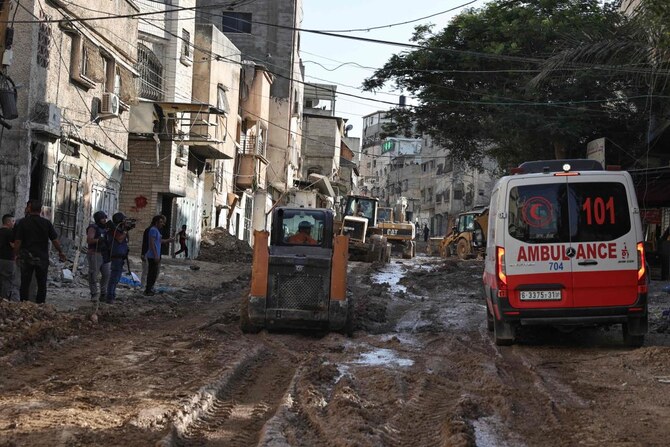JERUSALEM: The UN agency for Palestinian refugees said Friday one of its employees was killed during an Israeli operation in the occupied West Bank, where raids have escalated since last month.
The United Nations agency, UNRWA, said the employee was its first to be killed in the Palestinian territory in more than a decade.
But he is among dozens of Palestinians killed during the large-scale Israeli operation which began days ago and is ongoing, with several more Palestinians dead since Wednesday.
UNRWA identified the employee as Sufyan Jaber Abed Jawwad, who worked as a sanitation laborer. It said he was “shot and killed on the roof of his home by a sniper” in Faraa refugee camp.
His death is in addition to those of six other UNRWA staffers the UN said were killed in the Gaza Strip on Wednesday during a strike on a shool-turned-shelter. It was the highest single incident toll for the agency, UNRWA said.
Mourners on Friday carried Jawwad’s body through the streets of Faraa, with his blue UN vest resting atop the Palestinian flag that covered him.
In nearby Tubas, funerals also took place for other Palestinians, who were killed by an air strike.
A military statement on Friday said Israeli forces had “conducted a 48-hour counter-terrorism operation” in the areas of Tubas, Tamun and Faraa — northeast of Nablus — killing “five armed terrorists” in an air strike.
It added that a sixth militant was also killed.
Violence in the West Bank had already soared alongside the nearly 12-month-old war in Gaza but in late August Israel began its large-scale raids.
Major Israeli operations in the West Bank are sometimes occurring “at a scale not witnessed in the last two decades,” the United Nations human rights chief said this week.
The official Palestinian news agency Wafa said the military withdrew from Tubas on Thursday evening, allowing the funerals there to go ahead, after the air strike which the Palestinian Red Crescent said killed them on Wednesday.
“I woke up in the morning to the sound of an explosion,” Ahmed Sawafta, father of one of the dead men, told AFP.
The fifth person killed was buried on Friday in Tamun, also in the northern West Bank.
Osaid Kharaz, who identified himself as a Hamas activist, told AFP at the funeral in Tubas that Israel “is attempting to impose a new reality and undermine the popular support for the resistance (to Israeli occupation) in the West Bank.”
Israeli Defense Minister Yoav Gallant announced on September 4 that the military would use its “full strength” to strike Palestinian militants in the West Bank.
He said he had ordered the military to carry out air strikes “wherever necessary” in order to “avoid endangering soldiers.”
Days later, the European Union’s top diplomat Josep Borrell said Israel aimed “to turn the West Bank into a new Gaza.”
Israeli forces this week also carried out operations around the northern West Bank city of Tulkarem.
A military statement on Friday reported four deaths “in the areas of Tulkarem and Nur Shams.”
It said “three of the terrorists were eliminated in an aerial strike on Wednesday, and the fourth terrorist was eliminated during close-quarters combat with the security forces.”
The armed wing of Palestinian militant group Islamic Jihad said that the strike killed three of its fighters.
Israel has occupied the West Bank since 1967 and has ramped up deadly raids in the territory since Hamas’s October 7 attack on southern Israel sparked the war in Gaza.
According to the Palestinian health ministry, at least 679 Palestinians have been killed in the West Bank by the Israeli military or settlers since October 7.
At least 24 Israelis, including security forces, have been killed in Palestinian attacks or during Israeli military operations in the territory during the same period, according to Israeli officials.


Rare death of UN worker as Israel pursues West Bank operation
Short Url
https://arab.news/4y2dr
Rare death of UN worker as Israel pursues West Bank operation

- The United Nations agency, UNRWA, said the employee was its first to be killed in the Palestinian territory in more than a decade
- UNRWA identified the employee as Sufyan Jaber Abed Jawwad, who worked as a sanitation laborer
Modi says India, Israel agree ‘no place for terrorism in the world’

JERUSALEM: India’s Prime Minister Narendra Modi on Thursday said that Israel and India agreed there was “no place for terrorism in the world,” as he wrapped up a two-day visit aimed at strengthening ties with Israel.
“India and Israel are clear that there is no place for terrorism in the world, in any form... We will oppose it shoulder to shoulder. We will always oppose it in the future,” Modi said at a press conference with Israeli Prime Minister Benjamin Netanyahu in Jerusalem.
“Humanity must never become a victim of conflict,” he added.
“India and Israel are clear that there is no place for terrorism in the world, in any form... We will oppose it shoulder to shoulder. We will always oppose it in the future,” Modi said at a press conference with Israeli Prime Minister Benjamin Netanyahu in Jerusalem.
“Humanity must never become a victim of conflict,” he added.
© 2026 SAUDI RESEARCH & PUBLISHING COMPANY, All Rights Reserved And subject to Terms of Use Agreement.












